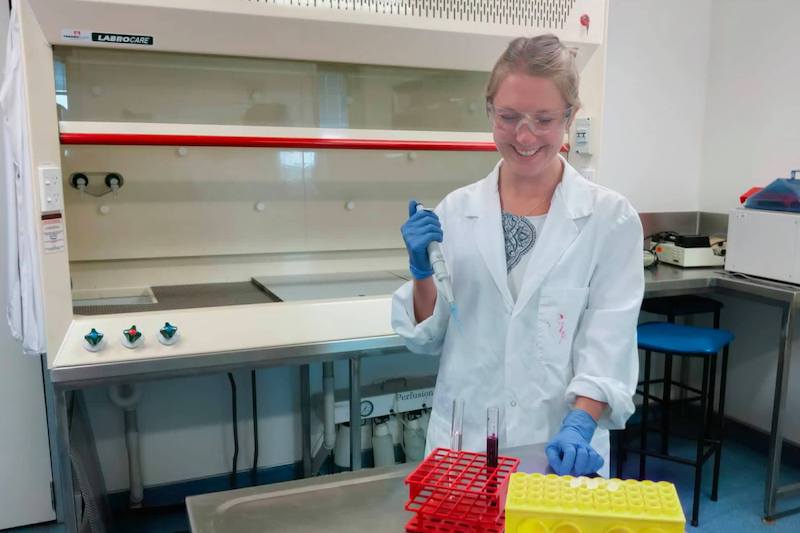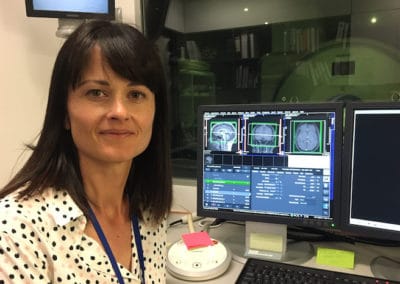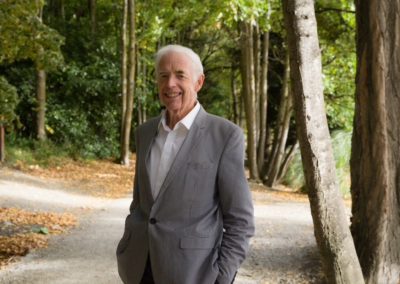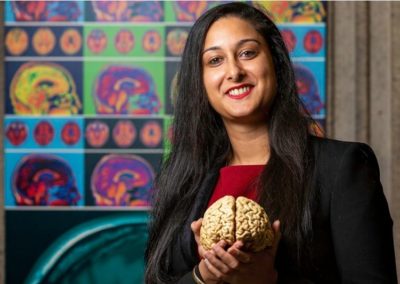Tell us a little bit about your research, what do you do?
I work with rat models of memory impairment. The lab that I am a part of looks at localised damage to structures within the memory circuit and how that presents behaviourally. My project has been exploring whether or not we can achieve recovery of memory function by stimulating a key structure within the circuit, distally located from the site of damage. We have been using a stimulation technique called optogenetics. This technique allows us to target particular cells within a neural structure so that they become sensitive to a certain wave length of light, enabling us to turn these neurons on and off using light stimulation. So far, the results look promising! This kind of research is important as it suggests that some memory loss, such as that found following thalamic stroke, may be amenable to intervention.
What do you enjoy most about your work?
I enjoy so much of it! I love being intellectually stimulated daily and constantly learning. The field of neuroscience is always evolving with new techniques and knowledge becoming available all the time. Carrying out your own experiments is definitely one of the best parts as you get to ask a question, and then use your own tools and resources to answer it. Takes time but it’s so satisfying.
How did you get interested in (neuro)science?
I loved science at school, and my Dad was (and still is) a passionate Biology teacher so continuing on with the sciences at University was a given. I took Psychology as a fun interest paper because I always thought serial killers were fascinating… and enjoyed both biology and psychology enough to force the two degrees together.
Which (female) scientist inspires you most?
Jane Goodall. I think she is an incredible individual. I went to one of her talks and was blown away not only by her passion for her research area largely focussing on the behaviour of free-living chimps but also by the way in which she has taken her acquired knowledge and applied it on a global scale. She has shared her knowledge with others, highlighted the need to protect chimpanzees from extinction and worked hard to include the needs of the local people and environment in her conservation efforts. So really she inspires a love for your field, and a desire to apply what you learn to making the world a better place. She’s a powerful role model and great humanitarian.
What were the greatest challenges you have faced as a female scientist? How have you overcome them?
I’ve sometimes questioned whether I am taken as seriously as my male counterparts, and I have found it intimidating to argue my case to those in a position of seniority. Overcoming these challenges takes locating a lot of your self-belief, being persistent and standing up for yourself no matter how daunting that may be.
What needs to change to make things better for the next generation of women and girl scientists?
Collegiality and collaboration. Women supporting women as they make their way down the academic pathway is so important and needs to be encouraged. Increased collaboration will really make things better for everyone, in that shared knowledge increases our chances of being able to make a real difference. I have been incredibly fortunate to have had access to two senior female scientists who have selflessly provided guidance and assistance when needed. So I think it is really important for those future women and girl scientists to have access to as many highly qualified and approachable female and male mentors as possible.
What advice would you give to young women and girls today?
Take the time to figure out what your passions are, pursue them with energy and determination and any obstacles you can’t go around, just push through. Working in the field you love is the most rewarding thing.
Sophie Barnett is a PhD student at the University of Canterbury. Her Phd is funded by Brain Research New Zealand and supervised by Prof John Dalrymple-Alford.
Read about more inspiring neuroscientists in our Women in Science series.



